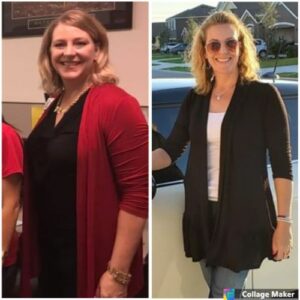National Nutrition Month

March is National Nutrition Month, a great time to check in with our New Year’s resolutions. Back in January I mentioned getting in shape. I’ve been running and completed my first 5K in almost 20 years! With my exercise routine in full swing, it is time to look at nutrition. Specifically, what changes need to be made nutritionally as we age?
A Personal Journey
As someone who has struggled with my weight my whole life, I have tried many fad diets, eaten extremely well nutritionally, and dove into the deep end of the fast food and feel-good snacks. I have walked through anorexia/bulimia alongside two friends and know the weird relationship we can have with food. My youngest had many food allergies as a child which forced me to look at food in another way; what we eat affects more than weight gain or loss. When he started football, I realized (through a good friend’s counsel) that I couldn’t feed him my typical low-fat foods. He needed the calories and the healthy fats to power him through long practices! With these experiences I look at nutrition as a big part of keeping me healthy as I age, and something we can do to help clients stay active, alert, and healthy as well.
Aging and Changing Nutritional Needs
It is no secret that as we age our metabolism decreases, and often, muscle mass as well. The need for calories decreases and we may naturally feel less hungry. However, the need for nutrients doesn’t diminish. As a matter of fact, the need for some nutrients may be even greater. As we age the intestines don’t work as efficiently, thus absorbing fewer vitamins and minerals. Sometimes medications can affect the sense of taste and smell, or there may be problems with chewing or swallowing. Physical limitations may prevent us from standing to prepare a big meal. Perhaps we don’t want to eat alone. Depression can affect appetite. For many reasons a poor diet replaces our once nutritious family meal.
Studies link poor diets to diminished mental ability. Lack of nutrients can cause intestinal issues, muscle weakness, fatigue, pale and/or dry skin, and thinning hair. This is a common list of complaints. What if the answer isn’t in the medicine cabinet or something we must “accept” as we get older, but on our dinner plate instead? What is recommended for seniors? I am suggesting that many of us need to make a mental shift in our thinking. Just as I had to adjust nutrition for my son’s increased activity, we need to look at what our bodies need at this stage in our life. While there are overweight seniors that need to reduce fat, I would like to focus on those more often ignored, the seniors who aren’t eating enough.
What to do…
Let’s walk through this. You aren’t eating that much so you skip meals but then indulge in sweets and chips. You are getting calories, right? Quick foods may be tasty, but they are nutritionally empty. You need to feed your body and your brain for optimal health and to avoid the chronic illnesses that are associated with aging. What you eat plays a huge role in diabetes, heart disease, bone loss and cancer. Not very hungry? Choose a small meal or snack that is still yummy but also nutritionally dense. Consider fruit, nuts, or low-fat cheese. Apples and cheese or peanut butter are great snacks. My go-to may sound gross, but try it, trust me! I love low fat Greek yogurt (fruit flavored) with a tablespoon of peanut butter. That is my new indulgent treat instead of grabbing a cookie or dish of ice cream. Meal planning may be more important now than ever. Make a list and plan out breakfast, lunch, dinner, and snacks. Look at the foods on your list as fuel. There are quick, healthy options like rotisserie chicken, precooked hard-boiled eggs, and pre-cut frozen veggies. Should you entirely skip the dessert? Absolutely not! As they say, everything in moderation. I am my father’s daughter. I love pie and a cup of coffee after dinner. It’s an occasional indulgence that I enjoy thoroughly.
In addition to what we are eating, let’s look at how. Stop eating alone. Invite a friend, have a potluck, go to a senior center. People eat more when someone eats with them, and let’s face it, it’s a whole lot more fun. If you have trouble chewing or swallowing, consider seeing a dentist and talk to your doctor. Sip liquids frequently while you eat. If you are losing your sense of taste, add more color and texture to your plate to make things more interesting. (How about adding a few nuts and grapes to a salad? A little crumbled goat cheese?)
Ask for help
If you are experiencing weight loss, please contact your doctor. You should also talk to your doctor before starting any new nutrition plan, especially if you need to plan your meals around a specific medical condition such as diabetes or heart disease. Ask about possible medication interactions. If we can help with meal planning, shopping, or preparation, please contact us. We have so many beautiful seniors who have already successfully negotiated these nutritional changes and can pass on what they have learned. Bon Appetit!


